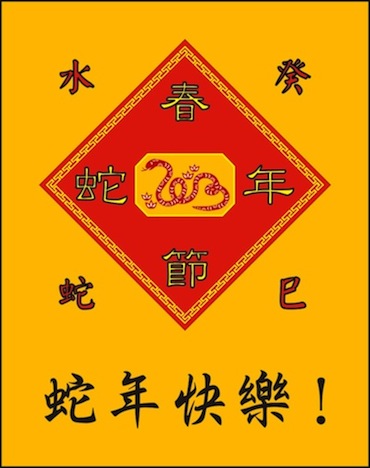The Chinese year 4711 begins on February 10, 2013. According to the Chinese zodiac it will be the Year of the Snake, euphemistically referred to as the 'little dragon'.
Anyone born during one of the following Chinese calendar years was born under the sign of the snake:
Jan 23, 1917 - Feb 10, 1918
Feb 10, 1929 - Jan 29, 1930
Jan 27, 1941 - Feb 14, 1942
Feb 14, 1953 - Feb 2, 1954
Feb 2, 1965 - Jan 20, 1966
Feb 18, 1977 - Feb 6, 1978
Feb 6, 1989 - Jan 26, 1990
Jan 24, 2001 - Feb 11, 2002
Characteristics and Careers for Year of the Snake
Considered to share snake characteristics, these individuals are thought to be wise, shrewd, insightful and compassionate, but also proud, vain, possessive and manipulative.
Careers supposed to be suitable for persons born under this sign include scientist, analyst, surgeon, artist, musician, spiritual leader, psychologist, sociologist, philosopher or politician.
Persons born in Snake years are reckoned to be compatible with persons born under the signs of the Ox or Rooster, and incompatible with persons born in a Pig year.
Famous persons born in Snake years include Mae West, Howard Hughes, Greta Garbo, Grace Kelley and Martin Luther King, Jr.
[Note: Mandarin pronunciations are transcribed below using the pinyin system. Pronunciation in other dialects, such as Cantonese, can be quite different.]
Chinese Lunisolor Calendar
The Chinese calendar is lunisolar and not purely lunar. Months begin with the new moon when it is darkest. New Year's Day usually falls on the second new moon after the winter solstice. The year 1 on the Chinese calendar corresponds to the first reign year of the legendary Emperor Huang Di, the "Yellow Emperor,” who is said to have invented the calendar during the 61st year of his reign.
The most familiar aspect of the Chinese zodiac is the cycle of twelve animals - one per year - that begins with the rat. A lesser known cycle is that of the five elements (五行; pinyin: wǔ-xíng): wood (木; pinyin: mù), fire (火; pinyin: huǒ), earth (土; pinyin: tǔ), metal (金; pinyin: jīn) and water (水; pinyin: shuǐ). The combination of elements and animals produces a 60-year cycle, so that a 60th birthday is special cause for celebration such as Dr. Yang's in 2006.
2013 is a Year of the Water Snake. Persons born in a Water Snake year are reputed to be more secretive than other snakes, but also exceptionally faithful among close friends and family.
Calendar: Heavenly Stems, Earthly Branches, Yin and Yang
Behind the elements and animals is a system of timekeeping involving the ten "heavenly stems" (天干; pinyin: tiāngān) and twelve "earthly branches" (地支; pinyin: dìzhī). The heavenly stems (甲乙丙丁戊己庚辛壬癸) correlate to the five elements (two per element, in the order wood, wood, fire, fire, earth, earth, metal, metal, water, water). The twelve earthly branches (子丑寅卯辰巳午未申酉戌亥) correlate to the twelve zodiac animals (in order: rat, ox, tiger, rabbit, dragon, snake, horse, ram, monkey, rooster, dog, pig). This year's stem and branch are 癸 (pinyin: guǐ) and 巳 (pinyin: sì), respectively.
Another lesser-known aspect of Chinese astrology is that the years alternate between yin (陰; pinyin: yīn) and yang (陽; pinyin: yáng). Because there is an even number of zodiac animals, each animal is considered either yin or yang. The snake is a yin animal.
Chinese Spring Festival
To Chinese, this most important celebration of the year is known as "Spring Festival" (春節; pinyin: Chūnjié). It is a time of family reunion. Family members gather at each other's homes for visits and shared meals, most significantly a feast on New Year's Eve. In Chinese societies, people may take weeks off from work to prepare for and celebrate this holiday.
During early periods of migration to the United States, many Chinese immigrants arrived without their families and found a sense of community through neighborhood associations instead. Today, many Chinese-American neighborhoods and associations host New Year's banquets and other events.
At Chinese New Year celebrations people wear red clothes, decorate with poems on red paper, and give gifts of "lucky money" in red envelopes. They also set off fireworks. Both the color red and loud noises were once thought to scare off a horrible beast that was believed to leave its lair each year at this time to eat villagers. The Chinese word for "year" (年; pinyin: nián) originates from the name of this beast.
In some areas of China it's a popular custom to give oranges, because the word used to say "orange" in those areas sounds similar to another word, which means "good luck". People present oranges to their friends and relatives to express their respects and good wishes for the coming year.
Typical Chinese greetings during the "Spring Festival" include 恭喜! ("Congratulations" - as if to say 'you made it through another winter!'; pinyin: Gōngxǐ!), 恭喜發財! (same as "恭喜!" but with the added wish to "Get rich!"; pinyin: Gōngxǐ Fācái!), 新年好! ("Good New Year!"; pinyin: Xīnnián hǎo!); 新年快樂! ("Happy New Year!” pinyin: Xīnnián kuàilè!); 新春快樂! ("Happy New Spring!” pinyin: Xīn chūn kuàilè!) and 春節快樂! ("Happy Spring Festival!” pinyin: Chūnjié kuàilè!).
Lantern Festival
The festivities of Chinese New Year traditionally end with the Lantern Festival on the fifteenth day (first full moon) of the new year. On this day, people hang glowing lanterns in temples, and carry lanterns to an evening parade under the light of the full moon. Some lanterns are works of art, depicting birds, animals, flowers, zodiac signs, and scenes from legend and history. The Lantern Festival celebrations often culminate with a dragon dance and fireworks.
(Dragon year dates, famous "dragons" and astrological characterizations were obtained from "The Complete Book of Chinese Horoscopes" by Lori Reid, published by Barnes & Noble Books, 1997)
